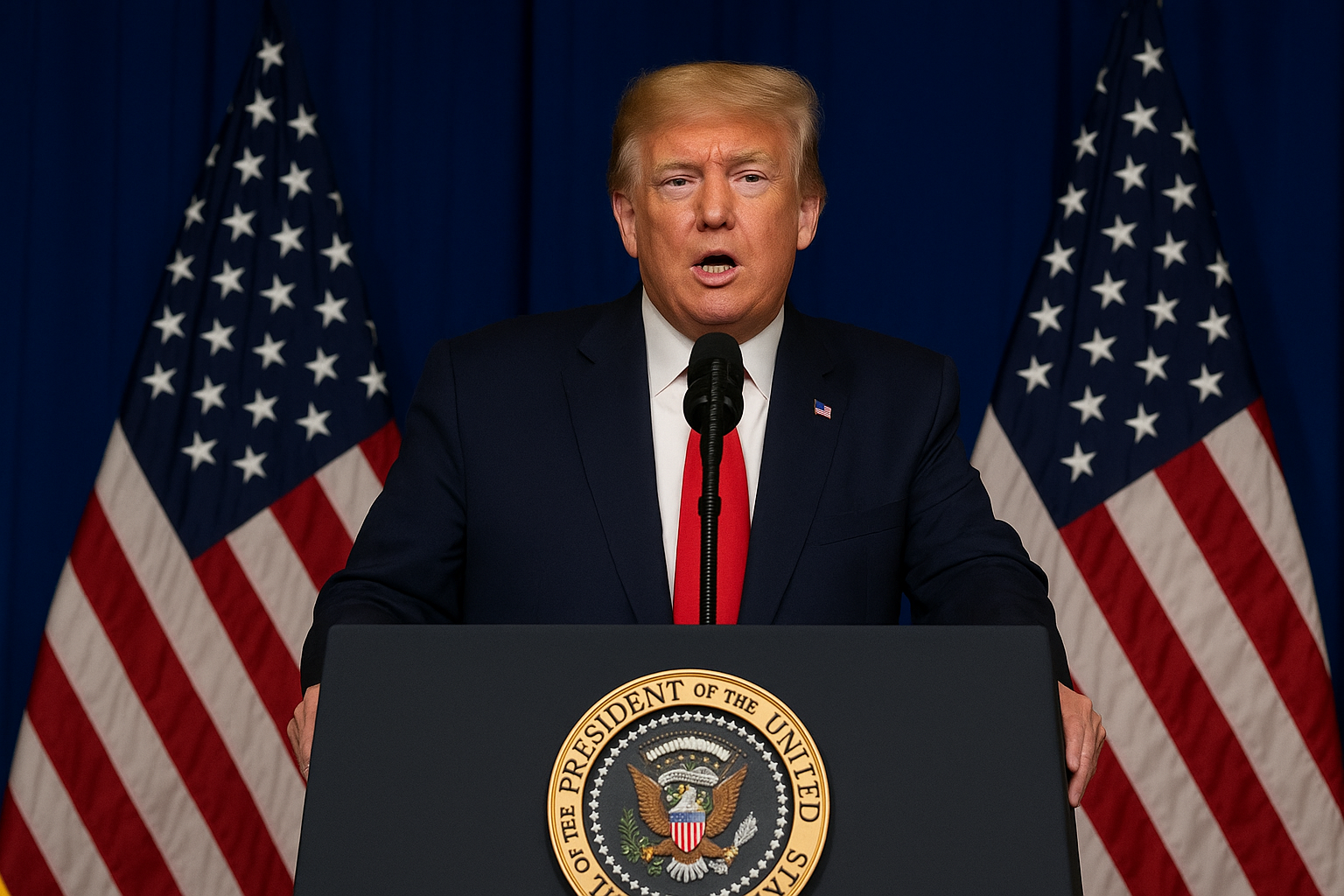In a striking shift in U.S. foreign policy, President Donald Trump on Monday unveiled a new arms package designed to boost Ukraine’s defensive capabilities. At the same time, he issued a stark warning to Russian President Vladimir Putin: reach a peace deal within 50 days or brace for harsh economic consequences.
The warning included the threat of imposing 100 percent tariffs on all Russian goods entering the United States, coupled with sweeping secondary sanctions aimed at isolating Russia from the global economy. The move signals a sharp escalation in pressure tactics, marking a renewed U.S. commitment to supporting Ukraine while seeking to force Moscow back to the negotiating table.
The announcements, made during a press appearance at the White House alongside NATO Secretary-General Mark Rutte, signaled a major departure from Trump’s recent posture. Only weeks earlier, the Pentagon had halted weapons deliveries to Ukraine, pointing to internal disputes over long-term planning and how the financial burden should be divided. Trump is now making a dramatic shift in approach, pointing to his deepening frustration over Russia’s continued attacks on Ukrainian cities and what he described as Putin’s repeated “betrayals of trust.”
A Renewed Commitment to Ukraine
Speaking directly from the Oval Office, President Trump announced a multibillion-dollar weapons package, revealing that advanced U.S. military systems—such as the Patriot air defense missiles—will soon be deployed to Ukraine in coordination with NATO allies. The systems are anticipated to greatly enhance Ukraine’s ability to detect, intercept, and destroy the continuous barrage of Russian cruise missiles, ballistic rockets, and drone assaults.
“It’s a comprehensive delivery—everything included, right down to the missile batteries,” Trump remarked. “Some of the systems will begin arriving within days.” The move underscores Washington’s renewed commitment to Ukraine’s defense and marks a significant escalation in support amid intensifying Russian assaults.
He added that one NATO country had 17 Patriot systems prepared for delivery, and that a deal was in the works to redirect a majority of those units directly to Ukraine’s front lines.
“These are cutting-edge, top-tier weapons,” Trump stressed, noting that while the systems will be produced in the United States, the cost will be covered by NATO allies. He emphasized that the deal reflects a unified transatlantic effort to support Ukraine without placing the financial burden solely on American taxpayers.
Trump’s reversal stunned political observers, especially given his history of criticism toward NATO and skepticism of foreign aid. The president, however, portrayed the decision as both a strategic necessity and a moral obligation.
Enough Talk – Time to Act
Trump voiced mounting frustration with President Putin in unequivocal language, signaling a clear break from diplomacy and a shift toward decisive, forceful measures. He recounted his private conversations with the Russian leader, noting that their interactions often seemed cordial but were quickly overshadowed by fresh attacks on Ukrainian cities.
“My conversations with him are always very pleasant. I go home and say to the First Lady, “I had a conversation with Vladimir today—it went very well.” And she looks at me and says, “Oh, did it really?” Another city was just hit.’
He accused Putin of reneging on tentative agreements, claiming that on at least four occasions, they had been close to securing a peace deal—only for new bombings to derail progress.
“Talk doesn’t talk. Action talks,” Trump declared. “ He understands exactly what a fair agreement entails.” And if there’s no peace in 50 days, the tariffs will come—and they’ll be very severe.”
Escalating Pressure: Tariffs and Sanctions
Trump’s plan includes imposing 100 percent tariffs on Russian exports if no peace agreement is reached within the 50-day deadline. Even more significantly, he promised to implement secondary sanctions—targeting not just Russia, but also third-party countries that continue purchasing Russian goods, particularly oil.
This move would mark a radical shift in Western economic policy. Until now, most Western nations have avoided sanctioning countries like China, India, and Turkey for maintaining energy ties with Russia, fearing global market disruption.
Trump’s aides confirmed that these tariffs would apply broadly, with legislation already in progress. A bipartisan bill currently circulating in Congress would give the president authority to impose up to 500 percent tariffs on countries that continue to aid Russia economically. Congressional Republicans, said to be awaiting Trump’s signal, are now poised to act quickly.
International Reactions and NATO Coordination
NATO Secretary-General Mark Rutte hailed Trump’s announcement as a game-changer, warning that Moscow should take the warning seriously.
“If I were Vladimir Putin right now, hearing what you intend to do in the next 50 days, I’d seriously rethink my approach to negotiations over Ukraine,” Rutte remarked.
He went on to say that a unified bloc of countries—including Germany, the UK, Canada, Finland, Sweden, Norway, Denmark, and the Netherlands—is ready to partner with the United States in accelerating weapons shipments to Ukraine. “Speed is of the essence,” Rutte stressed. “Some weapons will be rushed in immediately, with replacements purchased from the U.S. afterward.”
Cautious Optimism in Kyiv
In Ukraine, the response to Trump’s sudden shift has been one of cautious optimism. Ukrainian President Volodymyr Zelenskyy confirmed his conversation with Trump, expressing gratitude for Trump’s commitment to support Ukraine and his willingness to work together to end the bloodshed and achieve a durable, just peace. Zelenskyy also met with Trump’s envoy, Keith Kellogg, in Kyiv to discuss joint arms production, enhanced air defenses, and a coordinated purchasing plan involving both the U.S. and European countries. “We look to the United States for leadership,” Zelenskyy stated, “because it’s evident that Moscow won’t back down unless its aggression is met with decisive force.”
Europe Reacts: Germany Signals “Decisive Role”
Germany’s Chancellor Friedrich Merz welcomed the new deal, saying Trump had “taken an important step” and pledging Berlin’s commitment to the initiative. “We are doing this in our own interests,” Merz added, though he noted that more discussions would be needed to iron out the operational details.
Meanwhile, EU foreign affairs chief Kaja Kallas praised the announcement but warned that 50 days was “a very long time” in a war where civilians are killed daily.
“Moscow won’t move unless the pressure intensifies — the path to peace demands stronger leverage.” It’s good the Americans are stepping up, she said.
Disillusionment in Russia
The announcement was met with disappointment and a sense of betrayal among some in Russia. Many had hoped Trump’s presidency would lead to a quick de-escalation of the conflict. According to Moscow correspondent, some pro-Kremlin voices expressed frustration, claiming the U.S. president could no longer be trusted.
A Gamble with Global Implications
Trump’s hardline pivot—combining diplomatic maneuvering, economic threats, and a surge in military backing—marks a daring strategic bet. With under two months to compel Putin toward peace or follow through on his ultimatum, the stakes are enormous, potentially reshaping the future of the U.S.-Russia dynamic and altering the course of the war in Ukraine.
Whether this bold approach results in peace or deepens the conflict, one thing is clear: Trump has dramatically reshaped the international conversation—and the countdown has begun.

